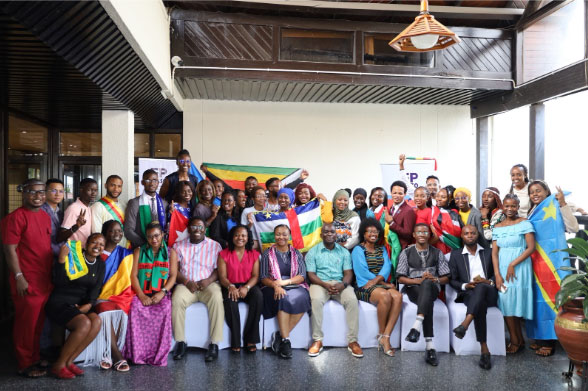Justin Ngong, Communication Officer, FP2030 NWCA
“Akwaaba!” in Twi (Ghanaian language) which means “welcome,” was being chanted as facilitators and participants flew into Ghana and were ready to make Ghana their new home for the entire week. A great blend of English and French cultures characterized some of the early activities introduced to make everyone settle down for business.
In a period wherein there is a high level of unintended pregnancy, unmet needs, and the necessity to delay first births, FP2030 commits to ensuring that adolescents and youth are equipped to make informed decisions about their sexual and reproductive health and family planning. To effectively deliver on this, the adolescent and youth portfolio developed a strategy document that outlines the FP2030 vision and guiding principles for young people. This strategy builds on five pillars; showcasing high-impact practice service delivery, prioritizing adolescents and youth in country commitments, programs, and policies, data-driven decision-making, championing youth leadership, and finally, building allies for adolescents and youth in decision-making spaces. On this premise, FP2030 sets out to organize a capacity-building workshop on the topic: “Institutionalization of adolescents and youth sexual and reproductive health programs” for youth focal points from Africa to socialize the just launched adolescent and youth strategy, train on SMART Advocacy, knowledge management, considered very handy skills to bolster youth engagement and effectiveness in delivering on their responsibilities as youth focal points.
From discussions, exercises, and presentations, participants were drilled on the different facets of SMART advocacy, setting advocacy objectives, and pitching advocacy campaigns to influence policies on sexual reproductive health and rights and, family planning for the first three days of training. With a blend of fun, participants got involved in exercises to help know each other with remarkable outcomes as shared by some.
“As the youth focal point for Senegal, I’m excited to meet Glory who is the youth focal point for Kenya. Glory’s engagement in sexual and reproductive health and family planning in Kenya is a great inspiration for me from Senegal and I’m happy that language barriers don’t exist in sexual and reproductive health/family planning initiatives. I’m happy that FP2030 thought it possible to bring together my colleagues from English-speaking Africa. We’re family and we’re the ones to make sexual and reproductive health/family planning services accessible to everyone young across Africa and the world at large.” Demba Samba Ba, FP2030 youth focal point, Senegal.
The adolescent and youth portfolio presented the FP2030 adolescent and youth strategy to youth focal points who expressed utmost satisfaction and accepted the responsibility to continue the socialization of the strategy in their respective countries and communities.
A good youth leader should be capable of having great mastery of knowledge management skills and design thinking thus, learning circle sessions coordinated by Knowledge Success centered on appreciative inquiry, one-for-all approach, troika consulting, all knowledge management techniques, etc. Youth leaders through sessions were able to consult each other on what works well and what doesn’t, receive expert advice from colleagues on how to manage difficulties encountered in the field.
This workshop is a bold step made by FP2030 in her agenda to build a regional global movement with and for adolescents and youth. It is with such steps that we dream of the possibilities of delivering for adolescents and youth by 2030. In closing the weeklong pieces of training, youth focal points made commitments to continue rendering sexual and reproductive health and family planning information and services to young people. Great appreciation goes to FP2030 partners in the likes of Knowledge Success, JHIEGO, and, the Center for Reproductive Health and Education, Malawi for their significant contributions in making this a success.
